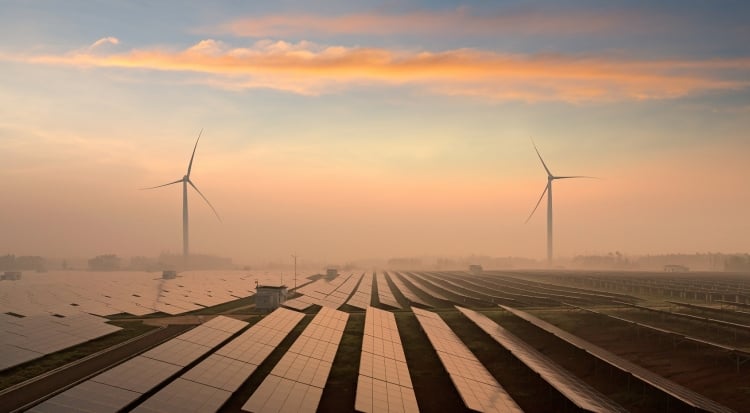
Globally renewable technologies produced 2,435TWh in 2020. Image: Getty.
Thinktank Ember has ranked the UK as sixth in the world for wind and solar generation, with the technologies contributing 29% of its electricity mix in 2020.
Its new report, Global Electricity Review, shows that the renewable technologies produced 2,435TWh in 2020, or almost a tenth of the world’s electricity. As such they’ve doubled since 2015, when they generated 1083TWh or 5% of the world’s electricity.
Denmark topped the rankings, producing 61% of its electricity from the renewables, followed by Uruguay at 44%.
The UK fell into a group that were able to produce around a third off their electricity from wind and solar, coming in at 29%, along with Ireland (35%), Germany (33%) and Spain (29%). While the majority of Ember's list of the top 15 countries are in Europe, Australia and South American countries, Uruguay and Chile also made the list.
Solar generation has been growing apace in the UK, with more than 14GWp-dc of installed capacity as well as a pipeline of 17GW.
Last year saw the technology break a number of records, including setting a new record for generation at 9.7GW and for highest share in the energy mix at 34%. Throughout May, the technology “comfortably” provided a third of Britain’s electricity supply on several occasions, National Grid ESO remarked in a report in January.
Ember found that electricity demand globally fell for the first time since 2009 due to the pandemic, although only slightly at -0.1%. In the UK, the drop in demand was keenly felt during the first COVID-19 lockdown hitting an all-time low of just 13.8GW in May.
Wind and solar generation have showed great resiliency though, with generation from the technologies rising by 15% in 2020. As they grow, coal is increasingly being pushed off grids, with a fall of -4% or -346TWh of coal generation last year.
But emissions globally still rose, and were 2% higher than in 2015. This is largely due to coal generation falling just 0.8% over the last five years, while gas rose 11%.
“Progress is nowhere near fast enough. Despite coal’s record drop during the pandemic, it still fell short of what is needed,” said Dave Jones, global programme lead at Ember.
“Coal power needs to collapse by 80% by 2030 to avoid dangerous levels of warming above 1.5 degrees. We need to build enough clean electricity to simultaneously replace coal and electrify the global economy. World leaders have yet to wake up to the enormity of the challenge.”
Britain’s electricity system is currently on track to be powered solely by zero carbon sources for periods of time by 2025, National Grid ESO announced in June. This will be a key milestone for a zero carbon electricity system by 2035, the target laid out in the sixth carbon budget.
Trade association Solar Energy UK recently called on the government to set a target of 40GW of solar by 2030 to ensure it aligned with the Climate Change Committee's recommendations.
